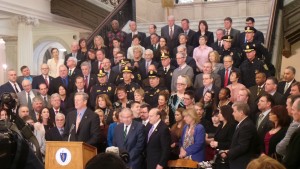Rep. Stanley has been a leader in the fight against addiction
 At the State House and in our communities, Rep. Stanley has become a community leader in the statewide fight against addiction. He has worked hard with members of the House and Senate to combat the opioid crisis and expand the necessary services for the Commonwealth’s most vulnerable citizens.
At the State House and in our communities, Rep. Stanley has become a community leader in the statewide fight against addiction. He has worked hard with members of the House and Senate to combat the opioid crisis and expand the necessary services for the Commonwealth’s most vulnerable citizens.
In the district:
Rep. Stanley helps prevent substance abuse in the community by serving as a board member on the Waltham Partnership for Youth and Waltham Youth and Community Coalition. He also recently spoke at the Waltham Overcoming Addiction (WOA) community forum.
In 2015, Rep. Stanley formed the Waltham Drug Task Force to look at substance abuse issues in Waltham with a particular focus on the opioid battle facing individuals and families in the community. The Task Force is comprised of local officials, stake holders and experts in the field who discuss ways to address the opioid epidemic and substance abuse in the City. In addition to Rep. Stanley, the group includes local resident Annette Reynolds, John Lawn, state representative, 10th Middlesex District, Michael Barrett, state senator, 3rd Middlesex District, Joe Vizard, Waltham city councilor-at-large, Beth Toolan, executive director, Waltham Partnership for Youth, Lt. Rich Manning, Waltham Police Department, and chairman of the department’s Drug Task Force, Jamie O’Neil, program director for Spectrum Health Systems & Waltham Outreach Patient Center, Shannon Mountain-Ray, Adolescent Substance Abuse Program at Children’s Hospital, Stephanie Sunderland, project coordinator for Waltham Partnership for Youth’s Drug Free Communities, Dr. Michael Reynolds and Marilyn Lee-Tom, executive director of the Community Day Center of Waltham, Inc.
On Beacon Hill:
Rep. Stanley supported the passage of a fiscal year 2017 budget which supports 45 new treatment beds at Taunton State Hospital with $13 million and revives a popular program from the 1990s that would give police departments $2.5 million in grants for community policing strategies.
Rep. Stanley supported House Bill 4056, an act relative to substance use, treatment, education and prevention which was signed into law on 3/14/16. This legislation:
- Limits first-time opioid prescriptions for adults and all opiate prescriptions for minors to a seven-day supply
- Gives patients the ability to request that a doctor prescribe less than the standard number of opioid pills or have a pharmacist fill less than the full amount of an opiate prescription
- Will make screening of middle and high school students for signs of substance abuse and addiction more regular across Massachusetts.
- Patients presenting in emergency rooms with symptoms of an overdose to be screened within 24 hours for signs of addiction before being discharged
- Requirement for drug companies to participate in a DPH “drug stewardship” program
- Require training in substance abuse disorders for medical licenses (medical and dental schools worked with Baker to make addiction education part of their core curriculum earlier in the year)
- Requires doctors to check the prescription monitoring program database each time before writing a prescription for a Schedule 2 or Schedule 3 narcotic and talk to patients about addiction each time an opioid prescription is written
Rep. Stanley has also supported the following legislation:
Chapter 8 of the Acts of 2016, an act relative to civil commitments for alcohol and substance use disorders. This bill states that Massachusetts women civilly committed for substance abuse treatment will no longer be sent to prison and instead will be referred to one of the 60 new state hospital beds slated to open this year.
Chapter 258 of the Acts of 2014, an act to Increase Opportunities for Long-Term Substance Abuse, which went into effect 10/1/15. This legislation mandates up to 14 days of medical detox (ATS) and Step Down Services (CSS) levels of care as well as new reporting by the Chief Medical Examiner’s office regarding overdose deaths.
Rep. Stanley also supported the Commonwealth’s Municipal Naxolone Bulk Purchase Trust Fund in which Attorney General Healey made an agreement with Amphastar Pharmaceuticals – maker of naloxone (Narcan) – to pay more than $300,000 (10,000 doses of Narcan) into the new trust fund to make the medication more affordable to cities and towns. The fund will be administered by the DPH and municipalities will purchase Narcan directly from DPH.